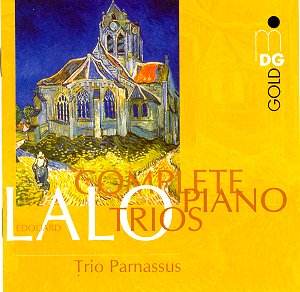A contemporary of the great masters Robert Schumann
and Johannes Brahms, the French composer Lalo was a most admired
composer in his day. Lalo’s Symphonie espagnole, for violin
and orchestra is now his most recorded and performed work by quite
a distance, with over a dozen versions in the current catalogue.
The Cello Concerto has also several available recordings
together with one or two versions of the violin concerto, the
Concert Russe, the Piano Concerto and his Symphony
in C minor which is available occasionally. As the majority
of these recordings have been in the catalogue for some years,
I sense that Lalo has become rather unfashionable of late. In
fact I cannot recall when I last saw a Lalo composition programmed
in a UK concert or recital programme.
Lalo was one of the nineteenth century composers
drawn to the composition of sumptuous orchestral and virtuoso
works. Yet as a member of a string quartet, in which he played
the viola and later the violin, he was also able to show his versatility
as a composer in the more intimate genre of chamber music and
composed a successful string quartet in 1859 rev.1880. Conversely
Lalo had already joined the trend away from the string quartet
towards the trio - a medium which featured an increasingly prominent
role for the piano. With his two piano trios composed around 1850-52
Lalo became one of the first French composers to write for this
combination and he went onto produce a third trio almost thirty
years later.
The four-movement form of the trios follows the
Germanic model of his contemporaries Schumann and Brahms with
a sound world somewhere between Mendelssohn and Schumann. Unlike
Lalo’s orchestral and concertante works which I often find too
predictable and sweet-toothed for my taste, these engaging and
colourful piano trios have an enormous vitality, combined with
a certain grittiness which took me by surprise. The only drawback
for me is Lalo’s failure to state memorable themes, which is probably
the reason that these works have not remained in the repertoire
unlike those piano trios of Mendelssohn, Schumann and Brahms.
The talented Trio Parnassus are most persuasive,
conveying a marvellous spirit which gives sparkle and joy to the
proceedings. I particularly like how the players demonstrate an
attentive ear for one another together with enviable individual
élan. Chai Chow is a marvellous chamber pianist, always
in control, leading the trio forward with tremendous assurance.
We are not informed what make of piano Chai Chow is playing but
the tone is superb. This is heard to great effect in the finale
of the Piano trio No. 1, on track 4, point 0:46. The string
players too give really fine performances, clearly relishing the
challenge, offering a gorgeous sound and marvellously in tune.
A fine example of their beautiful string playing is heard in the
allegro section of the Piano Trio No. 2,
on track 5, first from cellist Michael Gross at point 1:35, shortly
followed by the violin of Wolf-Dieter Steicher at point 1:57.
I am familiar with the only two comparative versions
of these three piano trios that I understand to be currently available
in the catalogue. There is a version from the Trio Salomon on
Meridian CDE84437 and secondly a superior set of the two from
the Barbican Trio on ASV CDDCA899. Neither of the Meridian and
ASV recordings can, I feel, compete with the style and vitality
of this version from the Trio Parnassus, which I now consider
to be the premier recommendation.
This digital recording of the Lalo Piano Trios
on MDG was recorded back in 1992 and although we are
not told I would guess that these works may have been previously
released. I have come across the Trio Parnassus on record a couple
of times previously and they are clearly a most talented ensemble
giving impressive readings of these attractive Lalo works. The
sound quality from MDG is very fine, if just lacking a touch of
transparency at the expense of warmth and the booklet notes are
informative but perhaps, somewhat too technical in parts.
This is a most beautiful and appealing release,
guaranteed to please chamber music lovers.
Michael Cookson
